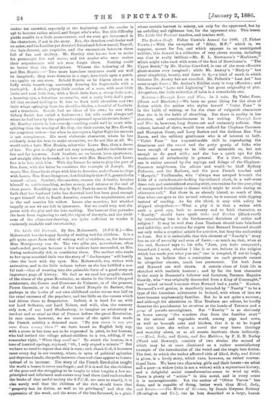NOVELS.—Through Love and War. In 3 vols. By Violet Fuse.
(Hurst and Blackett.) —We have no great liking for the class of fiction which the author who styles herself "Violet Face" is in the habit of writing, or for the class of valgarish characters that she is in the habit of sketching. But there is reality in her sketches, and conscientiousness in her writing. Through Love- and War is, however, long drawn-out and eminently tedious. One volume, instead of three, would have sufficed for Clapham Common and Hampton Court, and Lucy Barlow and the dubious Mrs. Van Buren, and the military gentleman who is of interest to both. "Violet Fane " has unquestionable skill in reproducing the dreariness and the ennui and the patty gossip of folks who have enough of money to he idle and miserable on, but not enough to do good with ; and she has a quick eye for the weaknesses of suburbanity in general. For a time, therefore, one is rather amused by the sayings and doings of the Clapham- Common neighbours, the odious and would. be bluff Sydney Podmore, and the Barlowe, and the poor French teacher and "Marquis," Vieilleroche, who "always was arrayed beneath the- folds of a melodramatic-looking fur-collared cloak, in a well-worn dress suit and embroidered evening shirt, convenient for the accepting of unexpected invitations to dinner which might be made during an afternoon call." But there is, as already hinted, so much of this, that when one gets to the second volume, he is content with dipping instead of reading. As for the third, it may with safety be skipped altogether.--What a pity it is that a writer with such a good eye, both to scenery and to Irish character, as " Naseby," should have spoilt Oaks and Birches (Blackwood) by introducing into it the fundamental doctrines of ethics and religion ? It may be well that Joan Tresham should hate falsehood and infidelity, and a matter for regret that Bernard Desmond should not only write a sceptical article for a review, but deny the authorehip to Joan. But it is undeniable that this element of "Naseby's " story has an air of unreality and even of farce,—so much so, that, when at the end, Bernard says to his wife, "Joan, you have conquered; henceforth I mast, whether I like it or not, believe in the religion which has made you what you are," one is tempted, if not to laugh, at least to believe that a conversion on such grounds cannot be altogether sincere, much less permanent. Yet both Joan and Bernard are well drawn. A certain class of Irish life is sketched with realistic humour ; and by far the best character in the story is Desmond's follower and factotum, Terence Maguire Cassidy, who "was originally descended from a King of Connaught,' and "acted as head baatinan when Bernard had a yacht." Kaukor, Desmond's evil genius, is manifestly intended by " Naseby " to be a type of the American adventurer in Ireland, with whom of late we have become unpleasantly familiar. But he is not quite a success ; and although his attentions to Miss Tresham are odious, he hardly
deserves the punishment he receives at the hands of Terence and a posse of pseudo-moonligbters. But " Naseby " is so obviously at home among "the wonders that from the familiar start" in the animal and vegetable world, among pigs and cows, as well as beneath oaks and birches, that it is to be hoped the next time she writes a novel she may leave theology and morality alone, or at all events inculcate them indirectly. —Mind, Body, and Estate, and Sea Maidens, by F. E. M. Notley (Ward and Downey), consists of two stories, the second of which may be at once dismissed as a rather unsatisfactory example of the introduction of the weird and the tragic into fiction.
The first, to which the rather affected title of Mind, Body, and Estate
is given, is a lively story, which runs, however, on rather conven- tional lines. We have two charming girls and their lovers—an artist an a peer—a widow (who is not a widow) with a mysterious hiatory,
and a delightful social transformation-scene to wind up with. There is plenty of " action " in this novel, and in every sense
it is unexceptionable. Yet the author of "Oliver Varcoe " has done, and is capable of doing, better work than Mind, Body, and Estate.—The House of Rintmon, by Jeanie Gwynne Bettany (Remington and Co.), can be beat described as a large, honest










































 Previous page
Previous page